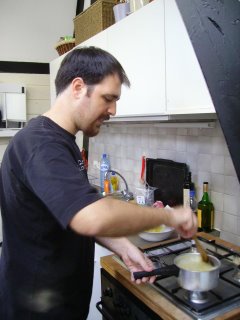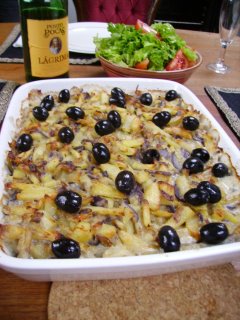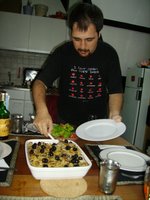 Though
Hugo avows he eats this meal "all the time", he has to admit it's the
first time he's prepared it himself. Usually he eats it at weddings or
his mom makes it. The very Portuguese main ingredient is codfish, though this fish does not actually swim in Portuguese waters. It is such an important fish a whole book is dedicated to it: "Cod, the Biography of the Fish that Changed the World".
Though
Hugo avows he eats this meal "all the time", he has to admit it's the
first time he's prepared it himself. Usually he eats it at weddings or
his mom makes it. The very Portuguese main ingredient is codfish, though this fish does not actually swim in Portuguese waters. It is such an important fish a whole book is dedicated to it: "Cod, the Biography of the Fish that Changed the World".To make the dried and salted fish palatable, it must be left to soak in water for 24 hours to soften it and to remove the salt. According to Hugo there are 1001 ways to prepare it, but Bacalhau com Natas, codfish with cream and potatoes, is his favorite. One thing he didn't realize beforehand was that it would take 45 minutes just to shred and debone the fish! For the lazy cook, pre-shredded cod exists, but it wasn't available in Amsterdam, where Hugo lives now. He is originally from Coimbra, a beautiful old university town.
Of course the onions and potatoes must be fried only in Portuguese olive oil. Even our fruit juice is from a Portuguese specialty shop and the white port we drink was a present from a friend.

While the fish, red onions, potatoes and cream are in the oven, we talk a bit about Portugal's rich history. It used to be a very influential maritime empire, especially in the 15th and 16th century. Macau was the last vestige of this wide array of territories, and was turned over to China as late as 1999.
 Hugo is actually researching one of the less tangible results of the his country's presence in India: the Portuguese creole language. The t-shirt he is wearing (at left) reads: "I got spat all over India", referring to the habit of spitting betel juice on-amongst others- innocent tourists.
Hugo is actually researching one of the less tangible results of the his country's presence in India: the Portuguese creole language. The t-shirt he is wearing (at left) reads: "I got spat all over India", referring to the habit of spitting betel juice on-amongst others- innocent tourists.Digging into the Bacalhau, I understand its appeal. It is real comfort food. I eat such a heaping the dessert, Tigelada, hardly fits anymore. This sweet custard is made with eggs, milk, sugar and port. Hugo serves "real Portuguese tea" to go with it, from the Azores. These islands, are the only part of Portugal where tea is harvested, and are a popular holiday destination.
We chat about one of the other, more typical, Portuguese export products: cork.
Wine bottles nowadays are often stopped with plastic corks, which Hugo explains, is more harmful to the environment, as it is not biodegradable or renewable, as natural cork is. I must admit, I had never given this subject much thought.
Now: an innovation on this website: links to recipes. Many people have asked for recipes. Though I did sometimes link to external recipe sites, from now on I'll try to give good English recipes for the dishes mentioned on the site.
Hugo's Portuguese Bacalhau com Natas
Tigelada
(The original post about this meal is from June 20, 2006)
No comments:
Post a Comment